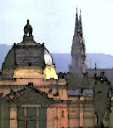 |
Vol 1, No 20
8 November 1999 |
|
|
 C E N T R A L E U R O P E A N N E W S:
C E N T R A L E U R O P E A N N E W S:
News Review for Croatia All the important news from Croatia since 30 October 1999 Sasa Cvijetic Croatia has (finally) passed an electoral law for the upcoming parliamentary elections. According to the law, which was not supported by the opposition parties or representatives of national minorities, the country will be divided into ten constituencies, each bringing 14 representatives to the House of Representatives. The 11th constituency will be specially designed for the election of representatives for Croatian citizens residing abroad (the so-called diaspora list), and the 12th constituency will elect five representatives from the various national minorities living in Croatia (that is, one for Serbs, one for Italians, one for Hungarians, one for Czechs and Slovaks and one for Ukrainians, Ruthenians, Austrians and Jews). The electoral system is purely proportional, with a 5% threshold. The so-called non-fixed quota will be used for the diaspora list. Numerous amendments (such as those on absentee voting, extra representatives for minorities, a 25% quota for female candidates, supporting lustration as a precondition for candidacy, etc.) were rejected by the Croatian Democratic Party (HDZ) majority. President Franjo Tudjman underwent emergency surgery at a hospital in Zagreb on Monday evening to correct the perforation of his colon. The team of physicians taking care of the President's health has been releasing daily statements claiming that he is gradually recuperating from the surgery. No special measures have been taken for someone else to perform the President's duties during his illness. Ivica Ropus, spokesperson for the ruling HDZ, announced that the House of Representatives will be dismissed on 12 November, 15 days before the official expiration of its mandate. Ropus said that demands by the opposition not to dismiss the House before the mandate expired were "over-dramatising the illness of the President." New elections will officially be called for 15 November and the HDZ's electoral campaign will start on 3 December, Ropus added. The main task for the House before its dismissal will be passing the interim budget for the first three months of 2000. At a public forum in Vukovar, Veselin Pejnovic, MP and secretary general of the Serb National Council, stated that the electoral law represents a catastrophe for Serbs in Croatia and that it most probably marks "the end of political life for Serbs in Croatia." Nevertheless, he invited all Serbs to come out and vote for those candidates whom they believe to be capable of representing Serbs best. The president of the Serb National Council, Milorad Pupovac, stated that the Council will ask for a judgement from the Constitutional Court on the constitutionality of the provision in the new electoral law according to which the number of Serbs MPs was reduced to one. The chief prosecutor of The Hague Tribunal for war crimes in the former Yugoslavia (ICTY), Carla Del Ponte, said in Zagreb on Thursday that due to Croatia's lack of co-operation in the investigations of crimes committed during the "Flash" and "Storm" military operations, she would report Croatia to the United Nations Security Council next week. Del Ponte said she was very disappointed with Croatia's refusal to fully co-operate with the Tribunal in connection with some of her investigations. She added that Croatia must acknowledge the ICTY's clear jurisdiction over all investigations pertaining to the war in Croatia, including the "Flash" and "Storm" military actions in 1995, through which Croatia re-gained jurisdiction over the parts of its territory controlled by the Serbs between 1991 and 1995. Deputy Foreign Minister Ivo Sanader received the ambassadors of Finland, Portugal and the representative of the European Commission in Croatia and gave them an official letter from the Government answering last week’s EU demarche to Croatia. While welcoming the EU's interest in developments in Croatia, the letter calls for a "more balanced approach by the EU and other international organizations during the election campaign." On Wednesday, the high representative for Bosnia-Herzegovina (B-H), Wolfgang Petritsch, met with Prime Minister Zlatko Matesa, Deputy Foreign Minister Ivo Sanader, Minister for Relations with B-H Milan Kovac and representatives of the "Opposition Six" to discuss the organisation of the Croatian parliamentary elections in B-H. Petritsch stated that "all Croatian citizens in Bosnia must be able to vote" and that the biggest problem in that respect will be the registration of all voters. Croatia's accession to the World Trade Organisation (WTO) will not be on the agenda of the November session of the WTO, thus postponing the issue again, probably until the March session. Sasa Cvijetic , 5 November 1999
|
|
![]()
Copyright (c) 1999 - Central Europe Review and Internet servis, a.s.
All Rights Reserved
 Education
Education